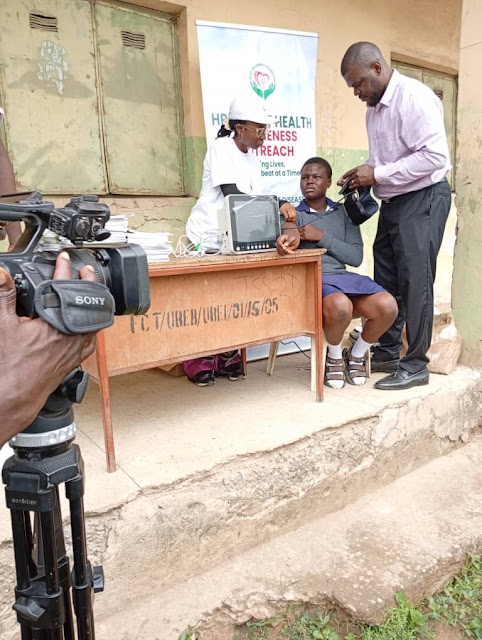The Federal Capital Territory Universal Basic Education Board (FCT-UBEB) has deepened its collaboration with the Heart Recovery Foundation (HRF), a non-profit organisation, to implement a school-based heart health awareness programme aimed at Junior Secondary School (JSS) students across the FCT.
The initiative, according to FCT-UBEB, is a critical public health intervention focused on promoting cardiovascular health and early detection of heart conditions among young learners.
Speaking at a press briefing in Abuja, Gabriel Kiaka, CEO of HRF, described the partnership as a strategic move to raise awareness among students and their parents about the dangers of cardiovascular illnesses and the importance of early intervention.
Kiaka shared that the Foundation was inspired by his personal experience with a life-threatening heart condition.
“I was born with an atrial septal defect (a hole in the heart), which enlarged over time. It grew to 3.7 cm, and I survived only by God’s grace,” he said.
He recounted the difficulties of raising funds for surgery and the eventual support he received through a scholarship from former Rivers State Governor, Nyesom Wike, which enabled him to undergo a successful open-heart surgery in India.
“Heart procedures cost between $10,000 and $12,000, which is beyond the reach of many Africans. My experience led me to start the Foundation to provide financial assistance and emotional support to those born with congenital heart defects,” he added.
HRF, he said, envisions an Africa where heart health is accessible to all, advocating for healing, awareness, and compassion.
“At Heart Recovery Foundation, we believe every heartbeat matters. We are committed to supporting individuals and families impacted by heart-related health challenges, especially congenital cases,” he said.
As part of its efforts, HRF has secured a partnership with the Federal Medical Centre (FMC), Abuja, to facilitate affordable open-heart surgeries for diagnosed children.
Kiaka disclosed that over 55 cases have already been detected in FCT schoolchildren through limited awareness efforts, even before the full-scale rollout. The goal is to reach 200 schools in the FCT with diagnosis, education, and care.
“We aim to sponsor 10 surgeries every quarter, advocate for those who can't afford treatment, develop a network of health professionals, and conduct community workshops and campaigns on heart health,” he explained.
The foundation also plans to distribute educational materials to 10,000 people, establish partnerships with 100 community organisations, and lobby for policy changes supporting heart health education and research.
Dr. Anumiri Chidozie Pascal, the programme’s lead doctor, emphasised the importance of early awareness and diagnosis.
“Congenital heart defects often go unnoticed. Our research shows that about 10 in every 1,000 patients are affected. Early detection is critical, but many health facilities lack the necessary tools,” he noted.
He called on philanthropists and the government to support HRF’s growing efforts, stressing the increasing number of undiagnosed heart conditions among children.
Mr. Sunday Adejoh Baba, a board member of HRF, affirmed the Foundation’s dedication to helping individuals live healthier, more fulfilling lives, stating:
“We are committed to offering the encouragement and medical support needed for recovery and long-term wellbeing.”
ADEOLA KUNLE








